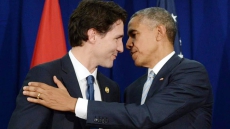TORONTO — The recent furor over comments by Toronto's outgoing deputy chief of police about cutting officers to save money focused the spotlight anew on policing costs that keep rising even as Canada's crime rate plunges and its economy sputters.
While communities across the country grapple with police budgets that in some cases are eating up to 50 per cent of their operating budgets, solutions to what's become a perennial headache have proven elusive.
"It's been a very frustrating discussion or dialogue that's occurred in this country over the last couple of years," says Tom Stamatakis, head of the national association that advocates for frontline officers.
"You've got a lot of people wading in with lots of opinions and personal views or biases around the whole cost-of-policing issue, but most of that dialogue is not informed by good research and evaluation."
One area of broad agreement is the lack of consensus on what constitutes cost-effective policing and how best to measure whether Canadian taxpayers are getting a solid bang for the more than 13 billion bucks they spend each year on what some see as an ever-thickening thin blue line.
Using falling crime rates to bludgeon budgets is unfair, some observers argue, because, among other things, it does little to capture how officers' roles have changed over the years, or how much of an impact policing has made on the decline in crime. The lack of hard data on how police jobs have changed has left older yardsticks, such as crime rates or the number of officers per capita, as commonly used measures.

"It's difficult to suggest what needs to be done if we can't even agree on what indicators need to be used," economist Livio Di Matteo said from Lakehead University in Thunder Bay, Ont.
Di Matteo says not much has changed since his September 2014 study for the Fraser Institute found a key cost driver to be the rising number of officers in Canada per 100,000 population. According to his analysis, per capita police expenditures rose more than 45 per cent between 1986 and 2012, while Criminal Code incidents per officer declined by almost 37 per cent.
Similarly, a report for the Macdonald-Laurier Institute in March 2014 by Christian Leuprecht, a professor at the Royal Military College of Canada, found call volumes to police remained stable between 2002 and 2012, but provincial expenditures on security grew at an average annual rate almost double the GDP growth.
While it should come as no surprise that unions would seek the best deals for their members, Leuprecht questioned why officers making upwards of $100,000 a year were performing administrative and other tasks that weren't related to core policing duties.
"Let's figure out what effects we want to achieve in terms of the community and how we're going to achieve those effects," Leuprecht said from Berlin. "We're not by and large having those conversations."
The Ontario Association of Municipalities agrees those key questions need answering. The association has been pushing for changes it says could be made immediately. Among them are fixing an arbitration system some feel consistently awards salary increases to police without regard to a community's ability to pay, and scrapping legislative barriers to "civilianizing" officer functions.

"We need to look at how we police our communities," association president Gary McNamara said.
Police, too, say they want that discussion. If taxpayers are ultimately their bosses, they say, those same taxpayers have to decide what they want from their police forces.
"It's a question of choices," Stamatakis said from Vancouver. "When you're talking about public policing, it is a service that is very much driven by the demand that exists in the community."
The cost issue bubbled up again earlier this year when Toronto's former deputy chief, Peter Sloly, said his police service, with its eye-popping $1 billion budget, could cut hundreds of front-line jobs.
"We run around all over the city in the most unfocused way, reacting to what you call us for, as opposed to trying to understand what's going on and ... putting our most important resources in the best place," the Toronto Star quoted him as saying in January.
Outrage was swift from the police union and brass alike. Sloly resigned soon after.
Stamatakis said he's not surprised by the backlash. He did, however, agree with the need for a "consistent and rigorous" review of internal police operations to ensure services are efficient and are deploying officers appropriately.

"That really hasn't happened that frequently in Canada and that's what we need to move to. But in order to get there, you have to get away from this uninformed, singular focus just on costs without knowing the context," he said.
Although Statistics Canada has reported the number of officers across the country has fallen slightly in the past few years, Leuprecht said most attempts at cost-cutting to date have amounted to tinkering around the edges.
Despite criticism many communities are over-policed, laying off officers is not the best way to save money, he said. Instead, forces should strictly curtail hiring.
"Basically, we cap authorized troop strength," he said.



